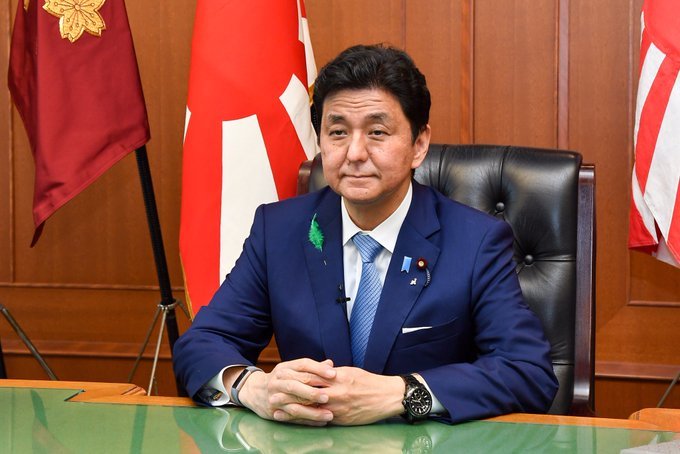(Provisional Translation)
(Release)
April 23, 2021
Ministry of Defense
Minister of Defense Mr. Kishi Nobuo attended the Climate Security session in the Leaders Summit on Climate
On April 23, Minister of Defense Mr. Kishi Nobuo attended the Climate Security session in the Leaders Summit on Climate and presented MOD/ JSDF’s latest effort against climate change as follows.
In this online session, representatives of participating countries presented their initiatives in the field of security in light of the climate change.
Provisional Translation of Minister KISHI's Remarks
Good afternoon. I am Kishi Nobuo, Defense Minister of Japan. It is a great honor for me to be given an opportunity to speak at this session on climate security.
Today, I will begin with my view on climate change as a security issue, and then make a brief explanation about the impacts of climate change to Japan and how Ministry of Defense, MOD is tackling these challenges.
First, climate change as security challenges.
Climate change is a “spiral risk”, a risk that causes a spillover. This is not just an issue about an environment of one nation, but it is a threat to the peace and stability of the international community as a whole.
Climate change makes our environment more difficult to live in. For example, it increases natural disasters such as floods and droughts. This would create a hot bed for crimes and extremism and destabilize our society. This would provoke more conflicts over territory and natural resources. These conflicts beget further environmental degradation, triggering iterations of next conflict.
Through such “downward spiral,” climate change presents risks to the world's security. And in the globalized world we live in, consequences of climate change felt in one place of the world will in fact have ripple effects globally.
Next, I’d like to talk about three ways climate change can affect Japan’s security.
First, increases of climate change-induced natural disasters have a potential to adversely impact the capacity of Japan Self-Defense Forces, JSDF.
In recent years, Japan has witnessed the frequency of torrential rains increase. As the frequency and intensity of natural disaster increased, the number of JSDF personnel involved in the relief operations increased, and so does the duration of the operations. This could beeither way at JSDF’s operational readiness for national defense missions. In fact, the total number of JSDF personnel involved in disaster relief operations topped 1 million for two consecutive years, 2018 and 2019. In recent years, JSDF reserves have been called up for disaster relief operations.
The second is the impact of rising sea levels. Oceanic encroachments results in permanent land loss, which would intensify struggle over territory and natural resources, and trigger mass migrations. This is a recipe for region wide destabilization. And if it happens in this part of the world, it will certainly have impacts on Japan's security.
In view of this, as part of comprehensive efforts for regional stability, Japan has been in close communication with Southeast Asia and Pacific Island countries, and engaged in capacity building assistance and other activities.
Third is the impacts of melting Arctic sea ice.
From Japan to Europe, if we take a sea route via the Arctic Ocean, the distance can be reduced to 60% of the existing route via the Suez Canal. Many sees huge hydro-carbon potential beneath the Arctic Circle seabed.
The melting of the ice has increased strategic importance of the Arctic Ocean. In 2020, a MSDF fleet, a Training Squadron, navigated the Arctic Ocean for the first time.
We believe that freedom of navigation in the Arctic Ocean is very important for the peace and stability of the world.
Finally, I would like to talk about MOD’s plan to reduce greenhouse gas emissions. In fiscal 2021, at least 50% of all MOD facilities will introduce renewable energy for electric power generation. Furthermore, we carried out a research project to apply hybrid electric diesel engine to ground vehicles, and we developed a prototype with this new system in 2014. Currently, in order to improve capacity of SDF vehicles such as increase of its electric supply, Japan is working with the United States to develop this research project.
In my view, activities for national defense and environmental considerations can go hand in hand. To make that happen, MOD will establish “Climate Change Task Force.” MOD is going to consider what we can do to deal with climate change in this task force going forward.
I have laid out my view on climate change as a challenge to the security today so far.
Lastly, climate change cannot be solved by one country. I will put forth every effort to tackle the issue hand-in-hand with all countries in the world.
Thank you for your attention.


